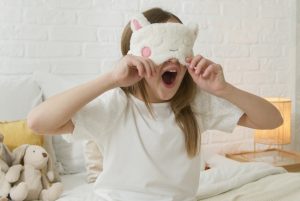The most common misconception about bedwetting solutions

During sessions at out bedwetting clinics, I am often told by parents that “My child never wakes up by himself to go to the bathroom” or “Tonight was the first time ever that he woke up by himself to go to the bathroom”. Without disrespecting the parents, it is important to understand that this is not a very important indicator of the child’s ability to stay dry at night.
Most parents and professionals alike believe that the purpose of a treatment with an enuresis alarm is to teach the child to wake up during sleep and to go to the bathroom to empty their bladder. This is totally false.
To understand why, we must first explain how the restraint mechanism works during sleep. During our sleep, our kidneys are still producing urine which fills up the bladder. When a small amount of urine is accumulated in the bladder, a signal is sent to the sub-conscious of the brain. The reflex system is meant to recognize this signal, and in response, activate some systems in our body which will cause us to contract the bladder sphincter muscle during sleep. The contraction will cause to the expansion of the bladder’s walls, which will relieve the pressure inside the bladder and the urge to urinate. This activity is performed during sleep and the child doesn’t need to wake up for it. This signal is being sent from the bladder to the brain about 5-6 times a night; it means that if the child stayed dry through the whole night, the restraint mechanism worked properly 5-6 times that night.
When the reflex system doesn’t properly recognize the signal, the child releases the sphincter muscle and urine is discharged, leading the child to wet the bed accidentally.
So why do some children wake during sleep and go to the bathroom and others don’t?
Waking up during the night is affected by several factors: bladder volume, the amount of urine inside the bladder, the bladder’s sensitivity, stage of sleep, time of night and more. This explains why the arousal response is stronger during the third part of the night – the pressure in the bladder is stronger since the amount of urine is greater and the depth of sleep is shallower.
So, when I’m asked if it is better that the child wakes up during his or her sleep, my answer is that the important issue is that he will stay dry regardless if he slept through the whole night or woke up to go to the bathroom. Some children will wake up every night, some won’t wake up at all and some will wake up occasionally.
No related posts.
Search
Recent Posts
- Summer Sleepovers and Bedwetting: A Parent’s Guide to Confidence and Comfort
- Hot Weather and Bedwetting in Children: What You Should Know
- Springtime and Bedwetting in Children: What’s the Connection?
- Understanding Restraint Mechanisms and Bedwetting in Children
- Giggling and Bedwetting: Why Laughter Sometimes Leads to Leaks
Categories
- ADHD
- adult bedwetting
- All about Bedwetting
- bed wetting
- bed wetting alarms
- bed wetting treatment
- bedwetting
- bedwetting blog
- bedwetting causes
- Bedwetting Dictionary
- bedwetting medication
- bedwetting solution
- bedwetting solutions
- bedwetting therapee
- bedwetting therapy
- diurnal enuresis
- dribbling
- How to stop bed wetting
- nappies
- News
- primary enuresis
- progress chart
- secondary enuresis
- sleep
- sleepovers
- The Solution – Therapee
Tags
Archives
- June 2025
- May 2025
- March 2025
- November 2024
- October 2024
- September 2024
- August 2024
- May 2024
- April 2024
- March 2024
- February 2024
- January 2024
- December 2023
- September 2023
- August 2023
- July 2023
- June 2023
- May 2023
- April 2023
- March 2023
- February 2023
- January 2023
- December 2022
- November 2022
- October 2022
- September 2022
- August 2022
- July 2022
- June 2022
- May 2022
- April 2022
- March 2022
- February 2022
- January 2022
- December 2021
- November 2021
- October 2021
- September 2021
- August 2021
- July 2021
- February 2015
- January 2015
- December 2014
- November 2014
- October 2014
- September 2014
- August 2014
- July 2014
- June 2014
- May 2014
- April 2014
- March 2014







